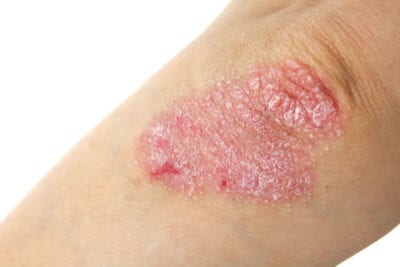Psoriasis Treatment
What is Psoriasis?
 Psoriasis is an autoimmune disease that causes raised, red, scaly patches to appear on the skin. There are five types of psoriasis: Plaque psoriasis, Guttate, Inverse, Pustular, and Erythrodermic. Psoriasis can show up anywhere—on the eyelids, ears, mouth and lips, skin folds, hands and feet, and nails. The skin at each of these sites is different and requires different treatments.
Psoriasis is an autoimmune disease that causes raised, red, scaly patches to appear on the skin. There are five types of psoriasis: Plaque psoriasis, Guttate, Inverse, Pustular, and Erythrodermic. Psoriasis can show up anywhere—on the eyelids, ears, mouth and lips, skin folds, hands and feet, and nails. The skin at each of these sites is different and requires different treatments.
Psoriasis treatment options
Psoriasis treatments can be divided into three main types: topical treatments, light therapy and systemic medications. During your consultation and evaluation in our Boca Raton, Boynton Beach or Fort Lauderdale office, your psoriasis dermatologist will determine which option is the best for you.
- Topical Treatments
Topical treatments include topical corticosteroids. These powerful anti-inflammatory drugs are the most frequently prescribed medications for treating mild to moderate psoriasis. They slow cell turnover by suppressing the immune system, which reduces inflammation and relieves associated itching. Topical corticosteroids range in strength, from mild to very strong. - Light Box Therapy
Light therapy or phototherapy uses natural or artificial ultraviolet light. The simplest and easiest form of phototherapy involves exposing your skin to controlled amounts of natural sunlight. At Clearlyderm, we use a Light Box that uses artificial light to safely expose skin to UVB rays, that slow the growth of skin cells affected by conditions such as Psoriasis or Vitiligo. Regular visits to our Light Box, usually 2-3 times per week, can treat outbreaks anywhere on the body.We even have separate individual boxes to treat isolated outbreaks on the hands or feet. This prescribed treatment is monitored by your Dermatology Provider and tailored to treat your unique skin condition. In some cases, Light Box Therapy may be used alongside topical and systemic medications and may even be covered by your insurance. - Systemic medications include retinoids, methotrexate, cyclosporine, and biologics.
- Retinoids: Related to vitamin A, this group of drugs may reduce the production of skin cells if you have severe psoriasis that doesn’t respond to other therapies.
- Methotrexate: Taken orally, methotrexate helps psoriasis by decreasing the production of skin cells and suppressing inflammation. It may also slow the progression of psoriatic arthritis in some people.
- Cyclosporine: Cyclosporine suppresses the immune system and is similar to methotrexate in effectiveness. Like other immunosuppressant drugs, cyclosporine increases your risk of infection and other health problems, including cancer.
- Biologics: These are drugs that alter the immune system. Several immunomodulator drugs are approved for the treatment of moderate to severe psoriasis. They include etanercept (Enbrel), infliximab (Remicade), adalimumab (Humira) and ustekinumab (Stelara). These drugs are given by intravenous infusion, intramuscular injection or subcutaneous injection.
While there is no known cure for this autoimmune disease, there are many psoriasis treatment options. ClearlyDerm’s expert psoriasis dermatologists will help you determine which option will be most effective for you. We look forward to helping you get your skin back to its best state!






